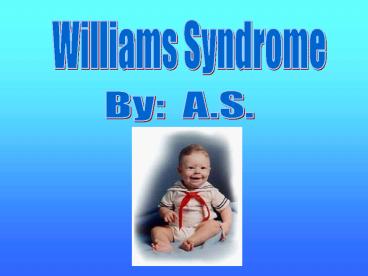Williams Syndrome - PowerPoint PPT Presentation
1 / 10
Title:
Williams Syndrome
Description:
People who have this disorder have 15 genes missing from one copy of chromosome 7. ... full lips *puffiness around the eyes. Adults with Williams Syndrome ... – PowerPoint PPT presentation
Number of Views:75
Avg rating:3.0/5.0
Title: Williams Syndrome
1
Williams Syndrome
By A.S.
2
Williams Syndrome
- What is Williams Syndrome?
- A rare, congenital (present at birth) disorder
characterized by physical and developmental
problems. Many who have this disorder suffer
from mild mental retardation. People who have
this disorder have 15 genes missing from one copy
of chromosome 7. - occurs 1 out of 20,000 births.
3
Who discovered this disorder?
- Dr. J.C.P Williams discovered it while working in
a New Zealand Hospital - He noticed children coming for heart surgery
were extremely friendly - So he did more research, and published some work.
- After this, he disappeared and no one heard from
him again.
4
Cause of Williams Syndrome?
- not caused by anything parents did or did not do
before or during pregnancy - Individuals are missing genetic material on
chromosome 7, including gene that makes the
protein elastin- (a protein that provides
elasticity to vessel walls.) - some medical problems are caused by deletion of
additional genetic material near elastin gene on
chromosome 7. - have 50 of passing on to children
5
What are the Symptoms?
- Heart and Vessel Problems
- Hypercalcemia (elevated blood calcium levels)
- Low birth-weight/low weight gain
- Overly friendly
- Developmental Delay
6
Minor Symptoms
- Feeding Problems
- Dental abnormalities
- Kidney abnormalities
- Musculoskeletal problems
7
Is There Any Treatment?
- There is not a cure for Williams Syndrome or
even a standard course treatment. - Individuals need regular monitoring for medical
problems and specialized services.
8
Pictures of ChildrenWho Suffered From Williams
Syndrome
Facial Features include wide mouth full
lips puffiness around the eyes
9
Adults with Williams Syndrome
majority of adults-master self-help skills and
complete school. employed in various setting
ranging from supervised to independent
jobs. many live with their parents or if
possible are able to live on their own.
Adults with Williams Syndrome
10
Links To Research more..
- www.wsf.org
- www.medstudents.com.br/raredi/raredi1.htm
- www.ninds.nih.gov/health_and medical_/disorders/w
illiams.htm































